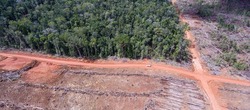Planned deforestation threatens Indigenous land, intact forest landscapes in West Papua
‘

The report found systematic violations of permitting regulations as plantations were pushed into forest areas. To make matters worse, forest and peatland protection measures introduced by the national government – such as the Forest Moratorium and the Oil Palm Moratorium – have not yielded the reforms promised and are hamstrung by poor implementation and a lack of enforceability. In fact, the government can take very little credit for Indonesia’s recent fall in deforestation. Instead, it is market dynamics, including the demands of consumers responding to biodiversity loss, fires and human rights abuses for palm oil, that are largely responsible for the decrease. Unfortunately, with palm oil prices surging and plantation groups holding massive uncleared forest land banks in West Papua, a disaster is poised to unfold.
The pandemic has only worsened the situation as the government introduced the controversial Omnibus Law on Job Creation – designed by oligarchic interests to dismantle environment and labor protections. On top of that, it made no progress on the recognition of Indigenous rights. To date, no Indigenous communities in West Papua have managed to obtain formal legal recognition and protection of their land as Indigenous Forest (hutan adat). Instead, they’ve seen their land handed to companies without their free and prior informed consent.
Kiki Taufik, Global Head of the Indonesia forests campaign at Greenpeace Southeast Asia said:
“Systemic forestry reforms have not materialised despite the opportunities presented by a decade-long forest moratorium and the international forest protection money already provided, with substantially more on offer. Before further funds are released, international partners and donors must establish clear and strict criteria that prioritize full transparency as a precondition. This would ensure that they are supporting effective implementation of Indonesia’s efforts to achieve good forest management and avoid a worsening climate crisis.
“Our investigation found strong relations and overlapping interests between Indonesian political elites and plantation companies in Papua Province. Former cabinet ministers, members of the House of Representatives, influential members of political parties and retired high-ranking military and police officers have all been identified as shareholders or board members of plantation companies featured in the report’s case studies. This allows for a culture where legislation and policy making are distorted and law enforcement is weakened. Despite the promise of a palm oil permit review, companies still hold permits over primary forest areas and peatland which had their protection removed and not a single area appears to have been taken back into the forest estate.”
In late February, a permit review team headed by the Governor of Papua Barat Province recommended over a dozen plantation licences be revoked, and the forest areas instead to be managed sustainably by their Indigenous owners. [3] If the leadership of neighboring Papua Province takes a similarly bold stand, and the national government lends support to both provinces, then West Papua’s priceless forests could avoid the decimation which has befallen forests elsewhere in Indonesia.
Full report can be found here
Notes:
[1] The forest area released for plantations is 951,771 ha; Bali has an area of 578,000 ha.
[2] This figure is almost half the annual carbon emissions of international aviation during 2018 (source).
[3] Joint Press Release by Papua Barat Province and Corruption Eradication Commission
Media Contacts:
Tyler Kruse, Senior Communications Specialist, Greenpeace USA
E: [email protected]; M: 1-808-741-2791
Rully Yuliardi, Communications, Greenpeace Indonesia
E: [email protected]; M: +62-811-8334-409













